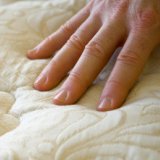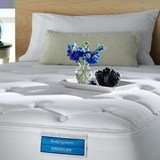Sleep Disorders in Children
It may come as a surprise to you that sleep disorders in children are relatively common.
In fact, nearly 30% experience some sort of sleeping disorder from the time they are young to the adolescent years. Sometimes, if the sleep disorder isn't addressed, the issue can continue into adulthood.
Children who have difficulty sleeping for one reason or another could exhibit symptoms such as irritability, fogginess, and difficulty staying awake during daylight hours, behavioral challenges, unusual mood swings, and potentially injuries because of the lack of sleep.
Common Sleep Disorders in Children
- Sleep walking - one of the most common for children between the ages of 8 and 12 years old. It's possible for a child to get out of bed with their eyes open but they will not be able to communicate or understand their surroundings. It's a good idea to slowly direct the child back to bed. Precautions should be taken to keep the child safe with gates, locks, and a bed on the floor rather than a bunk or loft bed.
- Night terrors - another very commonly diagnosed sleep disorder that occurs mostly in younger children between the ages of 4 years old and 8 years old. These are characterized by sudden outbursts in the middle of the night where the child may seem frightened. The child doesn't remember these, but his sleep is affected.
Sleep Disorders in Children
- Obstructive sleep apnea - most often this disorder shows up prior to the time a child has had her adenoids and tonsils removed. If you hear your child snoring, notice she is really tired during the day, sleeps with her mouth open, or seems to struggle with consistent breathing while asleep, you may want to discuss sleep apnea with your pediatrician.
- Wetting the bed - girls and boys both experience this sleep disorder mainly between the ages of 6 and 12 years of age. It can be a result of heredity, a physical problem, or emotional stress. Your physician can help you with methods of eliminating this sleep disorder.
- Delayed sleep-phase syndrome - a child who has difficulty falling asleep until the wee hours of the morning may have this disorder. Children who have this syndrome typically wake later in the morning and tend to sleep a lot longer than they should on days off. You may also notice his grades slipping in conjunction with these symptoms.
- Sleep-onset anxiety - children today experience a lot more stress in their lives than children of even a generation past. Children with this sleep disorder may have difficulty falling asleep because they are worried about family, school, sports, friends, or the like. It can also be caused by a traumatic event or death in the family.
- Narcolepsy - one of the rarest but most dangerous sleep disorders in children, narcolepsy can manifest itself in the way of sleep-onset hallucinations or paralysis or what is called sleep attacks, meaning the child cannot resist the inclination to simply go to sleep. This disorder shows up mostly in adolescents and some adults.
Natural Solutions for Treating Sleep Disorders in Children
Thankfully, there are natural remedies for treating sleep disorders!
Most children like to have a snack before going to bed, so choose the snacks wisely. Opt for a combination of whole grain carbohydrates and lean protein. Avoid sugary snacks and drinks at all costs!
Read a book instead of watching television. Books with a calming theme or nice rhythm are good choices. Television actually revs up our brains and bodies, which is the opposite effect we want for our children right before bedtime.
Warm milk isn't just your grandmother's remedy for inducing sleepiness - it actually can work! The calcium in the milk tells the brain to make melatonin, which is a natural hormone that helps you sleep.
Include foods throughout the day that contain magnesium. This natural substance helps the brain calm down at night in preparation for sleep. Foods high in magnesium include almonds, green leafy vegetables, oats, cocoa powder, wheat germ, sunflower seeds, pumpkin seeds, soybeans, and flax. You may have to get creative in order to include some of these, but it could help your child sleep better at night.
Try to keep nightlights and other appliances out of the bedroom. In reality, these don't help induce sleep, but rather keep sleep from coming as easily. If your child feels better having some sort of light in the room, opt for a clock radio with red colored numbers.
Change clothes before going to bed. Put on special, comfortable pajamas when you're preparing for bed. This signals the brain and body it's getting close to sleep!
Try to keep high levels of activity for the morning or afternoon and go for lighter physical activities for the evening whenever possible so the body has time to wind down.
The room should be kept dark and cool - no higher than about 72 degrees and no lower than 65 degrees to ensure the best sleeping environment.
Purchase a Quality Mattress and Bed Linens
We spend nearly a third of our lives sleeping on a mattress, so why shouldn't it be the best quality possible? A child's mattress should be supportive and comfortable so she looks forward to climbing into bed at the end of the day.
Many people aren't aware that bed linens can potentially cause sleep disorders in children because they contain chemicals that might inhibit sleep and can affect breathing patterns. Both of these factors can negatively affect a child's sleep at night.
Organic sheets, pillowcases, and comforters or blankets are well worth the extra money it takes to purchase them. The materials used to manufacture organic bed linens breathe naturally and will allow your skin to breathe too.
Your child's pillow should be supportive in both the neck and head area. A good way to test the pillow's firmness is to see if you can bend it in half without it bouncing back. If it bounces back, it's probably a supportive pillow. If it stays bent in half, it doesn't have the necessary support to help your child sleep well.
There is hope for treating sleep disorders in children! Try these natural remedies - you may be pleasantly surprised at the results!
Let's All Sleep Better
Help us to spread the word!
Simply copy and paste this code into your Facebook page or blog. Thank you for sharing!



New! Comments
Share your thoughts about what you just read! Leave me a comment in the box below.